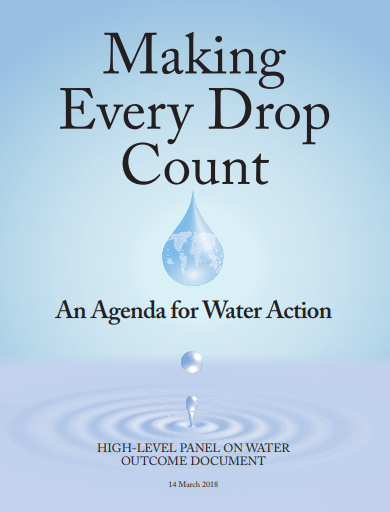Report warns 700m people at risk of displacement by intense water scarcity by 2030
- March 14, 2018
- Posted by: administrator
- Category: Environmental, Global

A new report by the High Level Panel on Water is warning that 700 million people are at risk of being displaced by intense water scarcity by 2030.
The High Level Panel on Water consisting of 11 Heads of State and a Special Advisor has issued a New Agenda for Water Action calling for a fundamental shift in the way the world manages water so that the Sustainable Development Goals (SDGs), and in particular SDG6, can be achieved.
This follows a 2-year mandate to find ways to accelerate solutions to the urgent water crisis.
Making Every Drop Count: An Agenda for Water Action presents many recommendations as part of an Outcome Report from the Panel, which was convened in January 2016 by the United Nations Secretary-General and the World Bank Group President.
“World leaders now recognize that we face a global water crisis and that we need to reassess how we value and manage water,” said UN Secretary-General António Guterres. “The panel’s recommendations can help to safeguard water resources and make access to safe drinking water and improved sanitation a reality for all.”
The Panel’s report found that the water crisis has many dimensions. Today, 40% of the world’s people are affected by water scarcity, with as many as 700 million people at risk of being displaced by intense water scarcity by 2030. More than two billion people are compelled to drink unsafe water and more than 4.5 billion people do not have safely managed sanitation services.
Women and girls suffer disproportionately when water and sanitation are lacking, affecting health and often restricting work and education opportunities. Water-related disasters account for 90% of the 1,000 most devastating natural disasters since 1990 and 80% of wastewater is discharged untreated into the environment
Ecosystems on which life is based all at risk because of how water is managed
“The ecosystems on which life itself is based – our food security, energy sustainability, public health, jobs, cities – are all at risk because of how water is managed today,” World Bank Group President Jim Yong Kim said. “The work of this panel took place at the level of heads of state and government because the world can no longer afford to take water for granted.”
As part of the recommendations to address the challenges, the Panel is advocating for evidence-based policies and innovative approaches at the global, national and local level to make water management and water and sanitation services attractive for investment and more disaster-resilient. The Panel also calls for policies that will allow for at least a doubling of water infrastructure investment in the next five years.
The Panel’s report sets out a new approach to catalyze change and build partnerships and cooperation, outlining why an integrated and inclusive approach that draws in sectors like agriculture, and other stakeholders, such as city mayors, is needed. The report makes the case that ways of working between, for example, governments, communities, the private sector and researchers, are essential.
In an Open Letter, the members of the panel conclude:
“Whoever you are, whatever you do, wherever you live, we urge you get involved, and contribute to meeting this great challenge: safe water and sanitation for all, and our water resources managed sustainably. Make every drop count. It’s time for action.”
